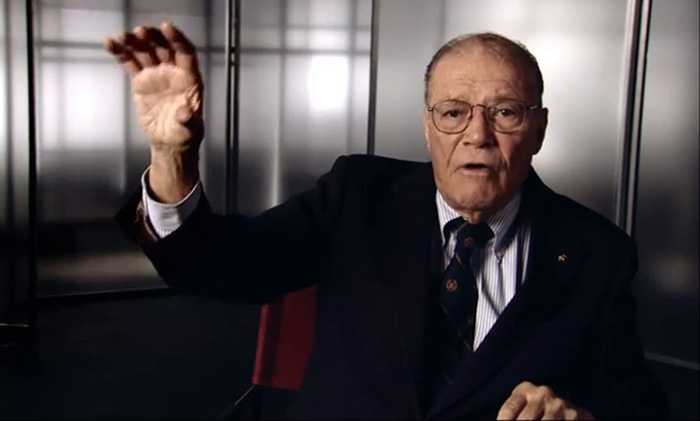
“The Fog of War: Eleven Lessons from the Life of Robert S. McNamara” is a profound documentary film that delves into the complex and often controversial tenure of Robert S. McNamara as the U.S. Secretary of Defense during the Vietnam War era.
Directed by the acclaimed documentarian Errol Morris, the film is not just a historical recount but a deep, introspective look at the human elements behind war decisions, making it an essential watch for anyone interested in history, ethics, and the art of documentary filmmaking.
One of the reasons this documentary stands out is its unique format. Through an engaging dialogue between McNamara, then 85 years old, and Morris, who remains unseen, the film presents a captivating first-person account of McNamara’s experiences and decisions during some of the most pivotal moments of the 20th century.
This intimate setup allows viewers to get closer than ever to the psyche of a man who was once one of the most powerful figures in the world, providing insights that are rarely captured in historical texts or biographies.
Errol Morris’s direction and narrative style add layers of depth to the documentary. Known for his meticulous research and innovative use of visuals, Morris complements McNamara’s candid interviews with a rich tapestry of archival footage, photographs, and Philip Glass’s haunting score.
The use of Morris’s trademark techniques, such as dramatic reenactments and the interplay of audio recordings, not only enhances the storytelling but also immerses the audience in the era’s ambiance, making the historical moments palpable.
The film’s timing also contributed to its significance. Released as the United States was embroiled in the Iraq War, “The Fog of War” drew stark parallels between the missteps of Vietnam and the contemporary conflicts, resonating with viewers and critics alike.
Its exploration of themes such as the morality of war, the limits of power, and the importance of empathy in leadership speaks volumes in any era, making the documentary remarkably prescient.
Moreover, the “eleven lessons” around which the film is structured offer a framework for understanding not just McNamara’s tenure but also broader lessons on governance, war, and human nature.
These lessons, ranging from the need to empathize with the enemy to the acknowledgment that rationality alone cannot save us, transcend the specific context of McNamara’s career, offering timeless wisdom for leaders and citizens alike.
One of the film’s most poignant lessons, “Proportionality should be a guideline in war,” is exemplified by McNamara’s reflections on the firebombing of Tokyo during World War II.
This lesson emerges from a critical examination of the use of overwhelming force, questioning the moral implications of actions that lead to massive civilian casualties.
McNamara candidly discusses the ethical considerations surrounding the campaign, which he was involved in as an officer under General Curtis LeMay. The firebombing, which resulted in the deaths of hundres of thousands of Japanese civilians, is presented not as a mere historical fact but as a moral quandary, illustrating the complex interplay between military necessity and the principles of humanity and proportionality in conflict. It also highlights the haunting reality that the line between war heroism and war criminality is often determined by the outcome of the conflict.
The documentary transcends traditional formats, blending historical documentation with philosophical inquiry in a way that challenges the audience to think deeply about the complexities of war and leadership.
“The Fog of War” is a documentary that goes beyond the life of Robert S. McNamara to touch on universal truths about humanity, power, and the often tragic consequences of our actions.
It is a film that deserves to be watched not just for its historical content but for its ability to provoke thought, stir emotions, and inspire a deeper understanding of the human condition.

Theodore Lee is the editor of Caveman Circus. He strives for self-improvement in all areas of his life, except his candy consumption, where he remains a champion gummy worm enthusiast. When not writing about mindfulness or living in integrity, you can find him hiding giant bags of sour patch kids under the bed.